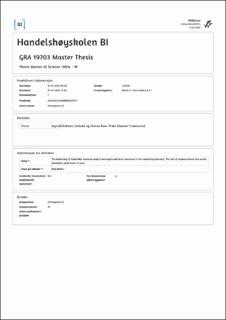The balancing of leadership between project managers and team members in the consulting industry: The role of empowerment and social-normative motivation to lead.
Master thesis
Permanent lenke
https://hdl.handle.net/11250/3034702Utgivelsesdato
2022Metadata
Vis full innførselSamlinger
- Master of Science [1621]
Sammendrag
This master thesis examines the nature of the relationship between a vertical
leader’s empowerment of a team member and the empowered team member’s
social-normative motivation to lead (SN-MTL) in project teams within the
consulting industry. Furthermore, it investigates whether level of self-efficacy (SE)
and team psychological safety (TPS) have moderating effects on the hypothesized
relationship between empowerment and SN-MTL.
Data was collected using a quantitative self-reporting questionnaire on N=83
respondents who worked as consultants in project teams located in Scandinavia.
Multivariate regression analysis was conducted in IBM SPSS to analyze data. The
results of the analyses revealed no significant relationship between empowerment
and SN-MTL. Consequently, no support was found for any moderating effects from
SE or TPS. However, a supplementary finding revealed a relationship between two
of the subfactors of SN-MTL and SE. The thesis contributes to the existing literature
on balanced leadership by emphasizing the importance of motivation to lead.
Furthermore, it sheds light on a gap in the literature in terms of the relationship
between motivation to lead and SE. The theoretical and practical implications of
the findings are discussed.
Key words
Project management, team, project team, consulting, Balanced Leadership Theory,
vertical leadership, horizontal leadership, Empowerment, Social-normative
motivation to lead, MTL, SN-MTL, Self-Efficacy, Team psychological safety, TPS.
Beskrivelse
Masteroppgave(MSc) in Master of Science in Leadership and Organizational Psychology - Handelshøyskolen BI, 2022
